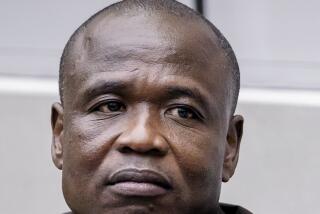Sudan Will Hold Peace Talks With Rebel Ugandans in the South
- Share via
JUBA, Sudan — The regional government in southern Sudan will soon hold peace talks with the Lord’s Resistance Army to stop the Ugandan rebel group’s cross-border abductions and plundering, the area’s president, Salva Kiir, said Thursday.
The talks will eventually include the Ugandan government in an effort to end the 20-year conflict there, which has swept thousands of children into forced fighting and sexual slavery.
Kiir said the LRA’s violent campaign had spread from northern Uganda to southern Sudan, the group’s longtime sanctuary, as the rebels sought new sources of food and money. The Sudanese government cut off aid to the militants last year.
“They have been raping women and girls. They have been killing. They have been looting. They have been abducting,” the president said. “I don’t want them to stay in south Sudan.”
The LRA’s messianic leader, Joseph Kony, has been in hiding since the International Criminal Court issued an arrest warrant in October accusing him and four other members of crimes against humanity. But in a surprise move, southern Sudan’s vice president, Riek Machar, met with Kony this month and gave him $20,000 for food so his forces would stop stealing from Sudanese villagers.
A videotape was leaked showing Machar handing Kony bundles of cash while cautioning him to spend it on food, not ammunition. It is believed to be the first meeting between Kony and an outsider in 10 years.
“We lured them out by asking them to seek the peaceful solution to the conflict. This is why they surfaced,” Kiir said of the LRA at a news conference after a meeting with representatives of the U.N. Security Council in Juba.
The U.N. officials arrived this week to help strengthen a nascent peace agreement between Sudan’s northern and southern regions, which had been at war. They also are trying to persuade the government in Khartoum to allow a 20,000-strong peacekeeping force in the western region of Darfur, which is riven by a separate rebellion.
Emyr Jones Parry, Britain’s ambassador to the United Nations and the leader of the delegation, said the LRA posed a threat to international peace and security and that Kony must not be allowed to escape international justice.
“We must all do better to ensure that the leadership is brought to justice and that this scourge is eliminated,” he said.
Human rights groups said Machar should have had Kony arrested instead of paying him not to attack.
“What happens when the government stops paying?” said Jemera Rone of Human Rights Watch.
But Kiir, the regional president, defended the move. He said that even if Kony was removed, another commander would quickly replace him, and that talking to him was the best way to end the violence. The payment was a way to gain his trust to start a dialogue, he said.
“A hungry stomach will never have ears to hear or understand what you are saying. So the money given to the LRA was for food,” Kiir said. If the rebels don’t leave Sudan, he said, future meetings won’t be as cordial. “We will, of course, participate in their arrest if that becomes the option.”
About eight LRA members arrived Thursday in Juba, the seat of the southern government, to prepare for talks. They gathered at a makeshift hotel made of rows of small trailers on the U.N. compound to discuss their strategy. Despite urging from Kiir to discuss their agenda with reporters, they refused to comment until they had met with the president.
Kiir also said that the International Criminal Court focus on Kony had disrupted prospects for peace. Uganda has offered Kony and the LRA amnesty if the group agrees to stop attacks in their homeland by the end of July.
The conflict with the LRA is just one of the challenges facing the new southern government, which Kiir said is “starting from zero” to build an independent region after ending two decades of civil war last year. There will be a referendum in 2011 on whether the region will secede from Sudan.
More to Read
Sign up for Essential California
The most important California stories and recommendations in your inbox every morning.
You may occasionally receive promotional content from the Los Angeles Times.










